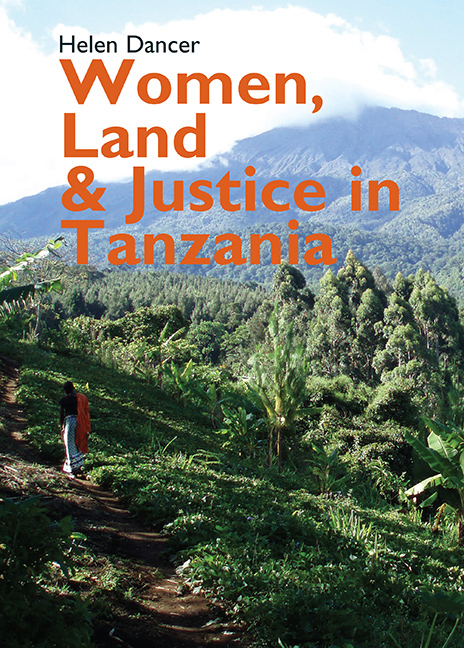Book contents
- Frontmatter
- Dedication
- Contents
- Acknowledgements
- Glossary of Kiswahili and Vernacular Words
- List of Abbreviations and Acronyms
- Table of Legislation
- Table of Cases
- Introduction
- 1 Social Origins of Women’s Claims to Land: Gender, Family and Land Tenure in Arusha
- 2 Women’s Claims to Land in Tanzania’s Statutory Framework
- 3 Making Legal Claims to Land: Agency, Power Relations and Access to Justice
- 4 Doing Justice in Women’s Claims: Haki and Equal Rights
- 5 ‘Shamba ni langu’ (The shamba is mine): A Case Study of Gender, Power and Law in Action
- Conclusion
- Appendix – Case reports
- Bibliography
- Index
- Eastern African Studies
- Frontmatter
- Dedication
- Contents
- Acknowledgements
- Glossary of Kiswahili and Vernacular Words
- List of Abbreviations and Acronyms
- Table of Legislation
- Table of Cases
- Introduction
- 1 Social Origins of Women’s Claims to Land: Gender, Family and Land Tenure in Arusha
- 2 Women’s Claims to Land in Tanzania’s Statutory Framework
- 3 Making Legal Claims to Land: Agency, Power Relations and Access to Justice
- 4 Doing Justice in Women’s Claims: Haki and Equal Rights
- 5 ‘Shamba ni langu’ (The shamba is mine): A Case Study of Gender, Power and Law in Action
- Conclusion
- Appendix – Case reports
- Bibliography
- Index
- Eastern African Studies
Summary
A MOUNT MERU SHAMBA
On the fertile lower slopes of Tanzania's second highest mountain, bounded by narrow mud pathways and bougainvillea hedgerows, there is a shamba. Over the years, banana trees, maize, beans and vegetables have been cultivated on this small parcel of land by successive generations of a family. The shamba lies surrounded by others just like it in the tranquillity of an Arusha mountain village. Yet on closer inspection it is noticeable that many of the banana trees have been deliberately slashed. Nothing remains of a woman's house that once stood there. The shamba, it turns out, is the setting of an extraordinary legal battle in which a woman farmer claimed that her land was sold by her husband without her consent. There is a notice nailed to a tree – a temporary High Court injunction restraining the husband and his agents from damaging the shamba or doing anything to prejudice the woman's interest in it whilst the court proceedings are ongoing.
The battle over this shamba is one of many in Arusha in an era of urbanisation and commoditisation of land in Tanzania. The journey of this woman to secure her interest in the shamba from village to High Court forms the subject of the final chapter of this book. The book as a whole takes her and other women's experiences of making legal claims to land as the starting-point for a contemporary study of the law in action in Tanzania's court system.
The urban fringes of Arusha city lie an hour's walk down the mountain from this shamba. A major highway connects Arusha with Nairobi to the north and Moshi and Dar es Salaam to the southeast, bisecting the city from the lower slopes of Mount Meru. The route has ensured Arusha's urban and rural development over many years. Arusha region as a whole attracts tourists and investors as well as migrant workers from other parts of Tanzania, East Africa and worldwide. Today the city is the hub of the East African Community, and the closest major urban centre to some of Tanzania's most significant mineral resources and national parks. Mount Meru's rich volcanic soil has made the land extremely valuable for large- and small-scale agriculture. Together, these factors have generated a burgeoning market for land and a climate for land-based investment.
- Type
- Chapter
- Information
- Women, Land and Justice in Tanzania , pp. 1 - 23Publisher: Boydell & BrewerPrint publication year: 2015



